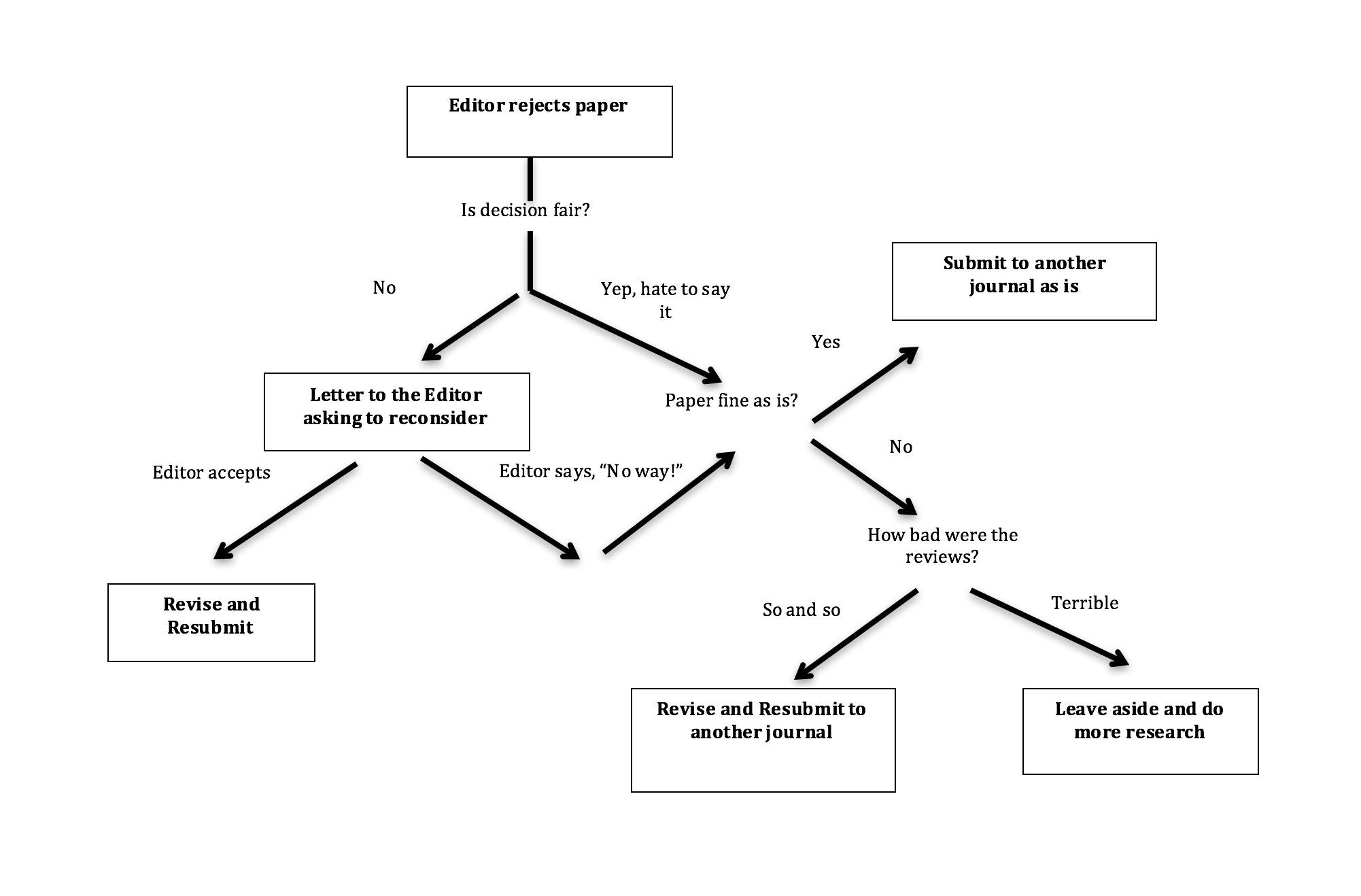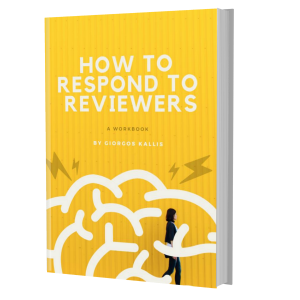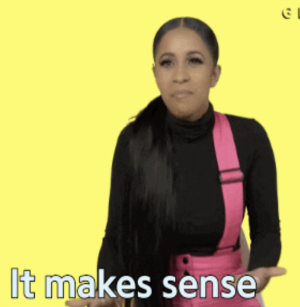My paper was rejected – what do I do now?
Dear Mr. Cardenas,
Thank you for submitting your manuscript to our journal. I regret to inform you that we have decided against
publishing your manuscript.
I have received reviews of your manuscript from three scholars who are experts on the topic. Their reviews are
appended below and/or attached. As you can see, while they find the topic of your analysis interesting and
relevant, they seriously doubt that the conceptual setup of your analysis is sound and fitting for the question under study.
I am sorry that I have no better news for you today. While my decision may be disappointing to you, please, understand
that our journal receives a very high number of submissions and can only publish a small fraction of those.
Again, we appreciate your submitting your manuscript to this journal and for giving us the opportunity to consider your work.
Kind regards,
The Editor
It’s morning. You open your inbox with a nice, if somewhat forced, smile on your face after half an hour of meditation where instead of thinking about your mantra, you were thinking about a better title for your paper, and complaining about your colleague who made a mean comment to you in the seminar. You are ready to sip your hot coffee with pleasure and start a nice day bent over like Quasimodo in front of the screen. And then the long-dreaded email arrives.
Your paper has been rejected! You are back to square zero. You need at least two published papers before defending your PhD and the clock is ticking. Your plan to train for the NBA as soon as you finish your PhD seems to be derailed. Now, what?
Do not worry. Here is a decision tree diagram for what to do next. If decision trees work for NASA when they have to decide whether to launch a rocket, or watch the final episode of Game of Thrones, they should do the job for you too.
First, is the decision of the Editor fair?
Read the reviews. Do they really amount to a rejection? If they do, are they fair, pointing to weaknesses in your work that you knew were there? If you have doubts, ask a more experienced researcher who has published more than you. What do they think? Is the Editor’s decision reasonable?
(If you are a starting researcher, and your meditation sessions are going wrong, you are likely to question yourself and to think that all of your work is horrible. If you have the faintest feeling that the Editor’s decision might be wrong, ask the opinion from a more senior researcher. Your work is likely not as terrible as you think it is and editors often make the wrong decision.)
Editors are humans like you and I - they make mistakes and they are willing to reconsider if someone convinces them to. If you think they made a mistake, then write a letter and ask the Editor to reconsider the decision. Write this letter as soon as possible, while the Editor remembers your case. You don’t want time to pass and your paper to be shelved. The Editor will be reluctant to reopen a closed case.
Write a short letter, no longer than a page long and send it in the body of an email. Be polite, the last thing you want is to anger an Editor by telling them they don’t know how to do their job. Be combative and give good reasons for why they should reconsider, following the approach and tone I explained in my piece and workbook on ‘how to reply to reviewers’.
Be succinct and give good arguments. If the Editor rejected your paper as out of scope, explain why it is relevant for the audience of the journal (if it is!), and what you can do to make this clearer in the paper. If the reviews are contradictory, argue to the Editor why he or she should pay more attention to the positive review, rather than the negative one. Point to weaknesses or mistakes in the negative review that might have escaped the attention of the Editor. If you think one of the reviewers might have been biased, because you criticized his or her work, argue this to the Editor, without getting into your conspiratorial mode (no my friend, Curt Cobain is not hiding with Adolf Hitler and Jim Morrison in Las Pampas.)
Editors are busy and know they haven’t done their homework perfectly. They receive so many papers that they can’t read them all. They trust the reviewers. So, if you think that a reviewer did not do a good job, and you have good arguments to prove it, they might listen.
If you convince the Editor, then he or she might give you a chance to resubmit, turning the decision from reject into ‘major revisions’ (or what some journals call ‘revise & resubmit’). Or, the Editor might invite you to rework and resubmit the paper as a new submission, taking into account the comments of the reviewers. This is not bad either. It is better than submitting to a new journal, since you are building on a history. The Editor will know next time that the paper has gone through a series of improvements (this does not mean that you will get any preferential treatment. Editors are always cautious with papers that have been rejected, and expect to see visible improvements, that amount to much more than standard major revisions).
Allow some time before you send the new submission. If you send it after a week or so, the Editor will think you didn't really rework the paper. Of course, it might well go the other way. The Editor might look at your email and give you a firm no – she has read your paper and agrees with the reviewers that it is not good enough. Or maybe you are dealing with a very prestigious journal like Nature where the Editors do not even bother to answer emails, and send you an automatic response, ‘thanks, but no, we receive too many papers. (And by the way Kurt Cobain told me you are a bad person)’.
Back to the meditation room, take deep breaths, focus on the mosquito on the wall, reboot and try again. Plan B.
If the Editor rejected your appeal, you are back to where you would be if you hadn’t appealed (see tree diagram). Indeed, there are many reasons why you should not appeal a rejection. You might have indeed submitted to the wrong journal. Or maybe it was the right journal, but all three reviewers agree that your paper is not good enough and there was little you could do to change the mind of the Editor.
The question for you then is the following (and you are not allowed to discuss it with either Kurt or Jim before responding): is the paper solid enough to be resubmitted as is, without changes other than reformatting, to another journal?
This could be the case if you are dealing with a desktop rejection, where the Editor ruled the paper as out of scope. Send it then to a journal that might be closer to the topic or more open to your approach (I will write a separate post soon on how to choose the journals that you submit to).
It could also be that you submitted to a very good journal, like Nature Climate Change. They are indeed picky. A lesser journal of Sustainability could accept your paper, so send it there without losing time trying to address the reviews of those who rejected your paper. The new journal will likely ask for new revisions, so why waste time and revise before submitting?
Now, it could be that the paper could benefit from some reworking before you send it elsewhere. Such reworking may vary from little to a lot.
Here is a personal example. With a colleague we sent a paper to five different journals, before one (a very good one actually) published it. We were submitting to journals outside of our usual community, and the negative reviews had much to do with the fact that the reviewers did not find the paper relevant for their field or us knowledgeable enough of the debates of their communities. The reviewers in the next journal might not have had the same concerns, so we did not bother to incorporate all comments before re-submitting elsewhere. But some of the comments that the reviewers provided were substantial and gave us ideas on things we could improve at a low ‘cost’ (of time).
Generally speaking, you don't want this process of revising and submitting to a new journal to drag on. You want to resubmit to another journal as soon as possible, and let the paper follow its fate there.
What you can do after a rejection is prepare a page where you write down the core comments of the reviewers and distinguish comments that can be addressed fairly easily, from comments that would take a lot of work to improve upon. Work only on the first group of comments before resubmitting the article to a new journal.
Now if you keep receiving rejections with similar comments, it means that it is time to reconsider strategy. This will also be the case if the comments in the very first rejection were so fundamental that they did not leave much hope.
If you are an experienced researcher with lots of publications, you have learned not to submit a paper that is not ready. But as a beginning PhD researcher you might have rushed and submitted a paper that was not fully finished – or reported on a research project that was not yet complete. Maybe your writing is still not good enough.
In that case you might have to reconsider - no, not the PhD, the paper! (I had the first abstract I sent to a conference rejected, and I am still around). But do reconsider what you are going to do with this piece of work that is rejected without much hope for improvement.
Maybe you will have to read all the works that have escaped your attention and that the reviewers pointed out. Maybe you have to run the regressions again because there are fundamental problems that the reviewers saw. Maybe you have to go back to the field and observe more or take more interviews. And maybe you have to rewrite the paper from scratch after doing more homework and practicing on improving your writing and research with tips from ‘how to write an academic paper’ benefitting from Dr Giorgos’s website (no relation to Dr Phil, none whatsoever).
‘Nevermind’, as Kurt would have said. Research is fun. Obstacles are there to make us stronger. And before I turn into a super-cheesy motivational speaker, here are my two cents of wisdom: a rejection is not the end of the world.
Work, enjoy what you are doing and your paper will eventually get published.
How have you dealt with a paper rejection? Do you have additional tips for others from your experience? Leave a comment below, and if you have additional questions, email me or leave them below and I will answer them in a future post.















